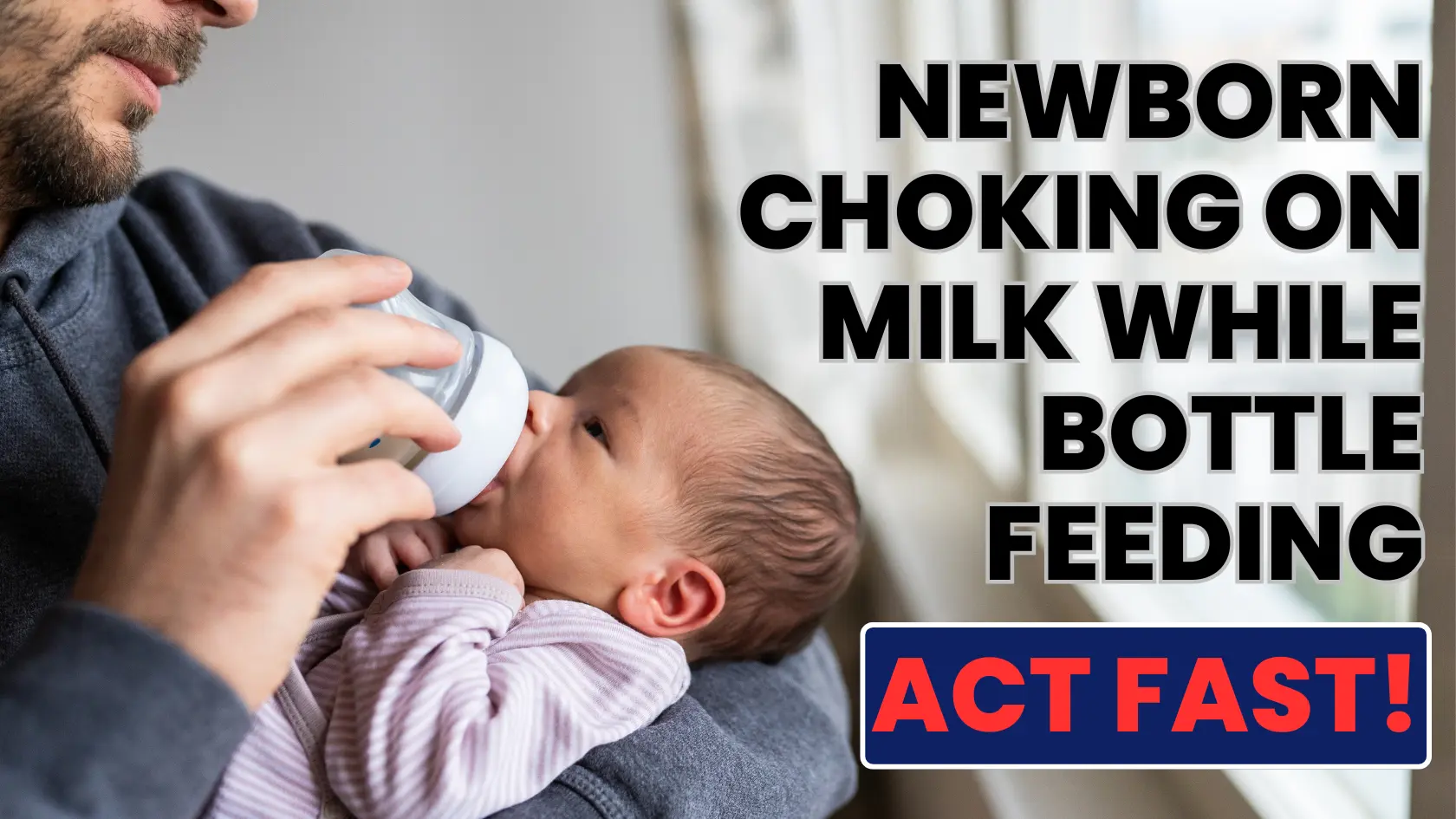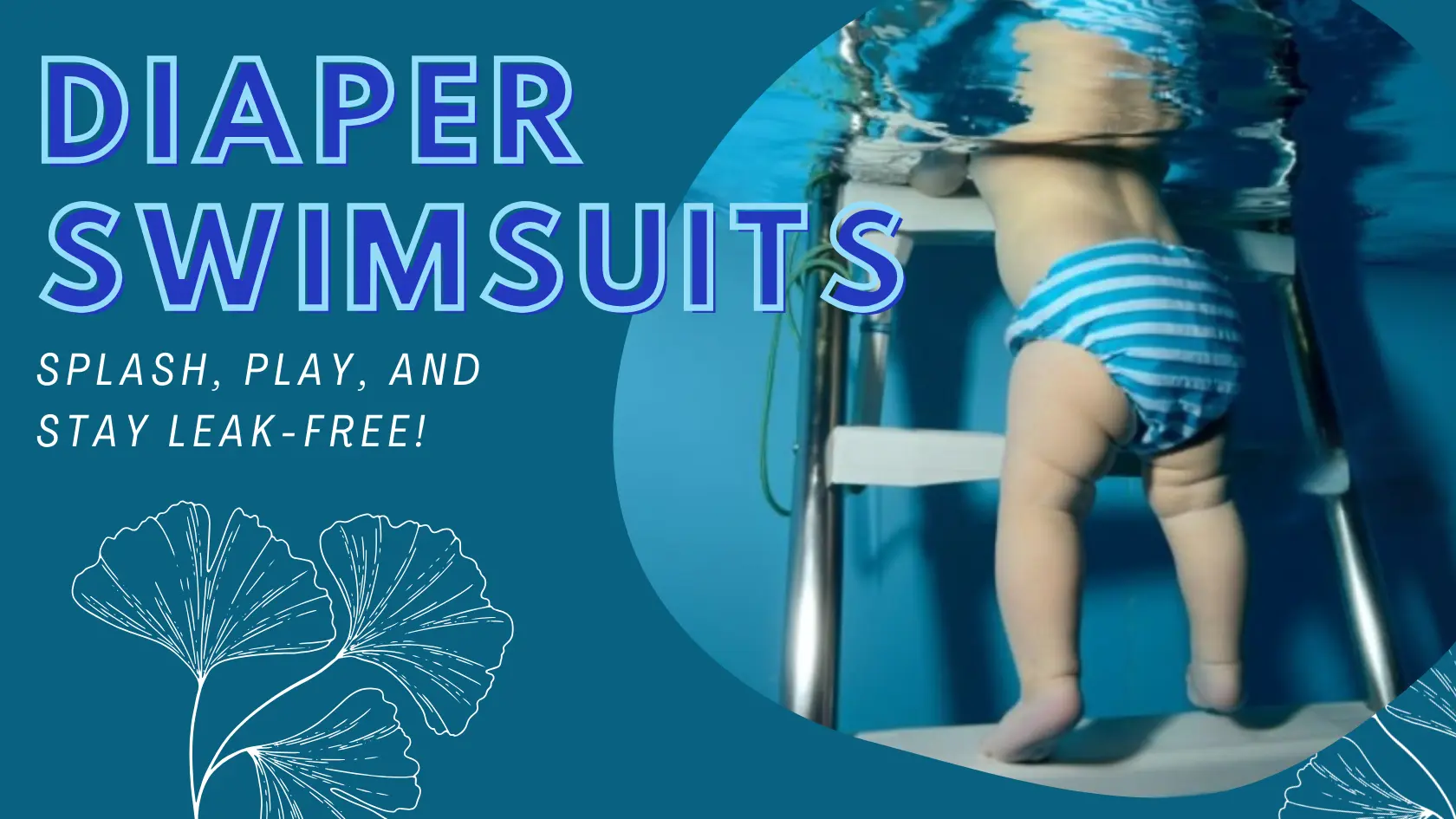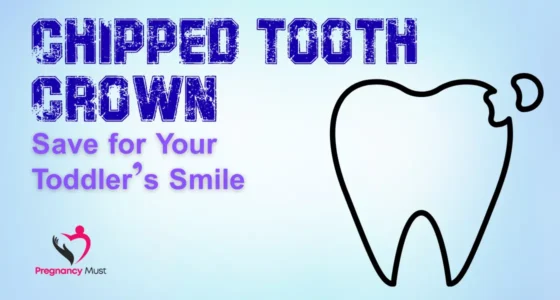Newborn choking on milk while bottle feeding is one of the scariest moments any new parent can face. It’s not easy to deal with such problems as a new parent. Seeing your tiny baby cough, gag, or struggle to breathe during feeding can cause panic—but understanding why it happens and what to do next can make all the difference.
Table of Contents
- Understanding Why Newborn Choking on Milk While Bottle Feeding
- What to Do If Your Baby Chokes on Milk
- Signs Your Newborn Might Be Choking or Struggling
- Can Babies Choke on Milk While Sleeping?
- How to Prevent Choking While Bottle Feeding
- Why Does My Newborn Choke on Formula?
- Can Newborns Choke on Breast Milk from a Bottle?
- What to Do When Baby Coughs While Feeding the Bottle
- When to Call the Doctor
- What to Do When a Newborn Chokes on Milk (Quick Summary)
- How to Prevent Choking in Newborns Long-Term
- FAQ: Common Questions About Newborn Choking on Milk While Bottle Feeding
- Final Thoughts
Let’s explore the causes, symptoms, and most importantly, the steps to take if your newborn chokes on milk, along with ways to prevent it from happening again. Whether your little one is bottle-fed with formula or expressed breast milk, this article will help you feed your baby safely and confidently.
Understanding Why Newborn Choking on Milk While Bottle Feeding
Even though it’s frightening, newborns choking on milk while bottle feeding is relatively standard. Babies are still learning how to coordinate sucking, swallowing, and breathing. If milk flows too fast or your baby drinks too eagerly, they can accidentally draw milk into the airway instead of the stomach.
Common Causes of Infant Choking on Milk
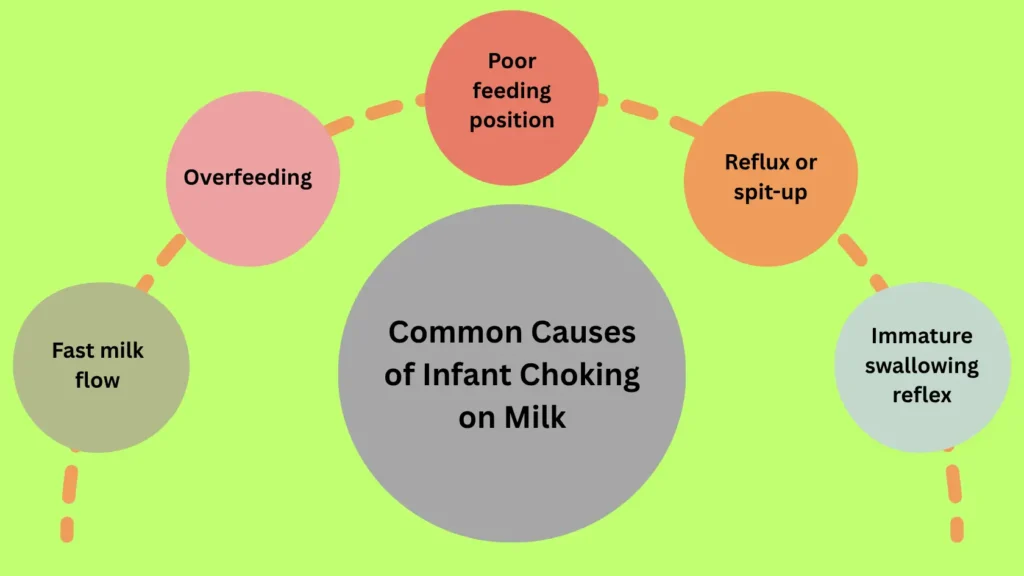
- Fast milk flow: Some bottles let milk out too quickly, which can make it hard for a newborn to swallow. If the milk comes out too quickly, your baby might cough, gag, or even choke. A slow-flow nipple will help your baby eat at a steady, comfortable pace.
- Overfeeding: If you give your baby too much milk at once, they may swallow more than they can handle. Their stomach are small, and when they get too full, milk can back up into their throats and make them choke or spit up. It’s better to give your baby smaller meals more often and pay attention to when they are full.
- Poor feeding position: If your baby is lying flat while drinking, the milk can easily go to the airway instead of the stomach. This makes it more likely that you will choke. When you feed your baby, always hold them at a slight angle so that gravity helps the milk go down smoothly.
- Reflux or spit-up: Many babies have mild acid reflux, which means that milk comes back up from their stomachs. When this happens, it can make you cough or gag, especially right after eating. Keeping your baby upright for 20 to 30 minutes after each meal can help a lot with choking that happens because of reflux.
- Immature swallowing reflex: Babies are still figuring out how to suck, swallow, and breathe at the same time. It’s normal for them to cough or gag every now and then because their throat muscles and reflexes are still growing. Feeding your baby gets a lot easier and safer as they get older and learn to control themselves.
What to Do If Your Baby Chokes on Milk
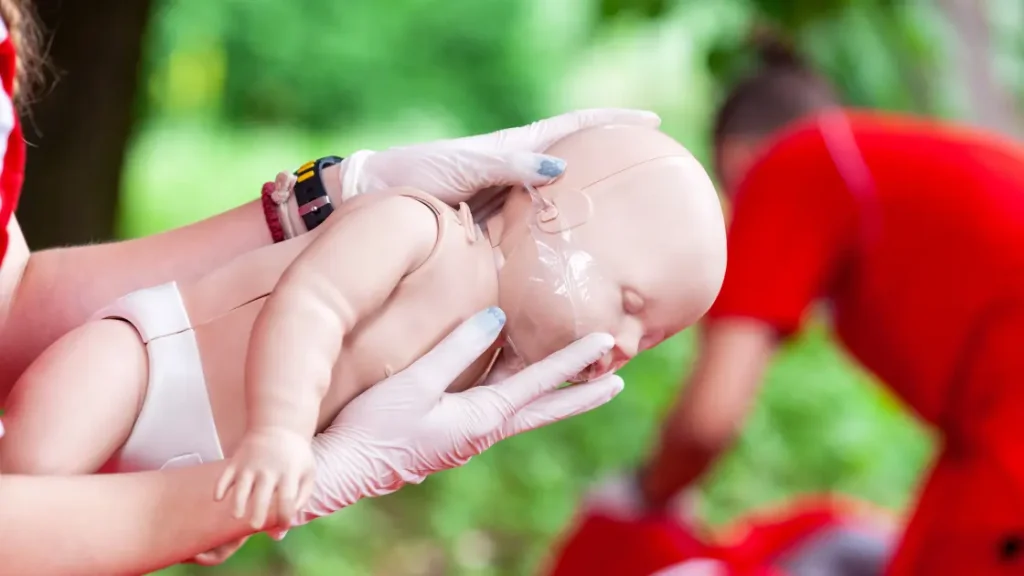
If you ever find yourself in a situation where your baby chokes on milk, the key is to stay calm and act quickly.
1. Assess the Situation
If you ever face such a situation where your baby chokes on milk, what will you do? The key to overcoming this kind of situation is staying calm and acting quickly.
2. If Your Baby Stops Breathing or Turns Blue
If your infant is choking on milk and can’t breathe, cry, or make any sound:
- Call for emergency help immediately (911 in the U.S.).
- Lay the baby face down along your forearm, supporting their head and neck.
- Give five gentle but firm back blows between the shoulder blades using the heel of your hand.
- If the obstruction doesn’t clear, turn the baby face-up, keep the head lower than the chest, and give five chest thrusts (like CPR compressions).
- Alternate back blows and chest thrusts until help arrives or the airway clears.
⚠️ Tip: If you’re unsure, taking a certified infant CPR and choking response class is one of the best things parents can do for peace of mind.
Signs Your Newborn Might Be Choking or Struggling

Knowing what to watch for can help you respond before things get serious. Signs include:
Coughing or gagging during feeding
When your baby tries to suck the milk, the milk does not come out as a fine stream, and your baby coughs or gags this is likely to be the first indicator that the milk is not flowing well. In case the milk flows very rapid or when they attempt to swallow before swallowing, they may cough or choke. It is a natural action of your baby clearing his/her throat and clearing their airways.
Milk coming out of the nose or mouth
Having milk in the nose or mouth: When milk leaks out of the nose or mouth of your baby, then there is a probability that the airway is irritated or possibly blocked partially. This may be the reason why they produce a high-pitched or raspy sound when they breathe. The next time you feed your baby, you should also ensure that you hold your baby upside down and pat his or her back to ensure that he or she is breathing easily.
Wheezing or noisy breathing
If your baby makes a high-pitched or raspy sound while breathing, it could be because milk has irritated or partially blocked their airway. Before you start feeding your baby again, hold them up, pat their back gently, and make sure they are breathing easily.
Red or blue face
Your baby’s face may turn red when they cough hard to clear their airway. If their skin starts to turn blue, though, it means they aren’t getting enough air. Stop feeding right away and do the first-aid steps for a baby who is choking.
Suddenly going silent
If your baby suddenly stops making noise or breathing while you are feeding them, it could mean that their airway is completely blocked. Do back blows and chest thrusts right away, and call for help right away.
Panic or flailing arms
Babies may wave their arms, kick, or look scared when they feel like they can’t breathe. These actions are a clear call for help. Before you go on, sit your baby up quickly, check their mouth and airway, and make sure they can breathe.
Even if your baby choked on milk briefly and seems fine afterward, keep an eye out for lingering symptoms like fast breathing, fatigue, or poor feeding. If any of these persist, consult your pediatrician.
Can Babies Choke on Milk While Sleeping?
Yes — though it’s rare, newborns can choke on milk if they are laid flat right after a feeding, especially if they have reflux or spit up frequently.
Safe Sleep Tips:
- Always place your baby on their back to sleep — never on their stomach.
- Burp them well before sleep.
- Keep the head slightly elevated (using an approved wedge or incline only if your pediatrician recommends it).
- Wait at least 20–30 minutes after feeding before laying them down.
Even though babies can choke on milk, keep an eye out for symptoms that last, like fast breathing, tiredness, or trouble eating. If any of these continue, see your child’s doctor.
How to Prevent Choking While Bottle Feeding

Prevention starts with proper feeding technique and equipment. Here’s how to keep feeding time safe and comfortable.
1. Use the Right Bottle and Nipple
- Choose slow-flow nipples designed for newborns to control milk flow.
- Check for signs of wear — old or damaged nipples may flow too quickly.
- Try anti-colic bottles that regulate air intake to prevent gas and choking.
2. Hold Your Baby in an Upright Position
Keep your baby at a 45-degree angle with their head higher than their chest. Avoid feeding while lying flat.
3. Practice Paced Bottle Feeding
Mimic breastfeeding is when you let your baby pause and breathe. Hold the bottle horizontally so milk doesn’t rush out. This technique helps your baby control intake and reduces newborn choking on the bottle issues.
4. Watch for Feeding Cues
Stop feeding if your baby:
- Turns head away
- Starts coughing or sputtering
- Appears full or drowsy
These signs mean they need a break.
Why Does My Newborn Choke on Formula?
If your newborn is choking on formula, it’s often due to the same reasons — fast flow, overfeeding, or incorrect position. But formula-fed babies may also swallow more air, leading to spit-up and coughing.
Pro Tips for Formula Feeding:
- Always mix formula properly (as directed on the label).
- Warm it slightly to body temperature for smoother swallowing.
- Burp your baby halfway through and after each feeding.
If choking happens often, switch to a slow-flow nipple or ask your pediatrician if your baby might have a sensitivity or reflux issue.
Can Newborns Choke on Breast Milk from a Bottle?
Yes, they can. Expressed breast milk in a bottle can flow faster than what your baby is used to when nursing directly.
Try paced bottle feeding and ensure the nipple matches your baby’s sucking ability. Some newborns prefer wide-base nipples that feel similar to the breast, helping them adjust.
What to Do When Baby Coughs While Feeding the Bottle
Coughing every now and then isn’t always bad. Most of the time, it’s just a sign that your baby drank too much milk or air. Stop feeding your baby, sit them up, and let them rest before you start again.
If your child coughs a lot, you should think about changing how you feed them or talk to your pediatrician about feeding therapy or positioning help.
When to Call the Doctor

You should always contact your pediatrician if:
- Choking or coughing happens at nearly every feeding
- Your baby frequently spits up milk or formula through the nose
- Feeding times are stressful or prolonged
- Your baby shows signs of reflux or poor weight gain
These could indicate underlying issues such as tongue-tie, reflux, or coordination difficulties that may require evaluation.
What to Do When a Newborn Chokes on Milk (Quick Summary)
- Stay calm.
- Encourage coughing if the baby can still breathe.
- If the baby can’t breathe or turns blue — call 911 immediately.
- Perform five back blows + 5 chest thrusts until the airway clears.
- Always follow up with your doctor afterward, even if the baby seems fine.
These quick actions can be lifesaving.
How to Prevent Choking in Newborns Long-Term
As your baby grows, feeding gets easier, but the risk of choking can remain. Continue using safe habits:
- Avoid propping bottles — always hold them yourself.
- Keep distractions low during feeding.
- Never leave a baby alone with a bottle.
- Clean nipples regularly to ensure proper flow.
The most important things are supervision, patience, and being aware. The more you know about your baby’s feeding schedule, the easier each session will be.
FAQ: Common Questions About Newborn Choking on Milk While Bottle Feeding
1. Can a baby choke on milk even if supervised?
Yes, even parents who are careful can let it happen. It’s important to act quickly because babies’ airways are small and fragile.
2. What to do if a newborn chokes on milk and stops breathing?
Call 911 right away. Perform infant back blows and chest thrusts while waiting for help.
3. Is it normal for babies to cough during bottle feeding?
Occasionally, yes. But if it happens often, check your bottle nipple flow and feeding position.
4. How do I know if my baby has reflux or another issue?
Frequent choking, gagging, or spitting up after feeds can signal reflux. Talk to your pediatrician for evaluation.
5. Can I prevent choking completely?
While you can’t eliminate risk entirely, using safe feeding practices drastically reduces the chances of infant choking while bottle feeding.
Final Thoughts
Every parent dreads the moment when their newborn chokes on milk while bottle feeding, but if you know what to do, you can handle it calmly.
Remember: choking doesn’t always mean danger — but being prepared means you can protect your baby with confidence.
Practice safe feeding, stay observant, and always trust your instincts. With patience and care, feeding time will soon become a peaceful bonding moment for both you and your little one.
Explore more on Pregnancy Must –
